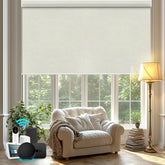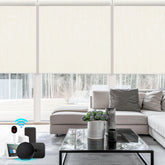Light Filtering vs Solar Shades: Best Window Treatment
When it comes to the selection of the appropriate window coverings, a great number of homeowners are left comparing the light filtering vs solar shades.
They are both trending as window treatments as they strike a balance between style, comfort, and functionality. Solar shades eliminate UV rays and minimize glare but do not make rooms dark during the process of filtering light, which makes them warm and cozy.
This guide will take you through all the information that you need to know when it comes to light filtering or solar shades, so that you can make an informed decision on what to cover your windows with this year.
Why Compare Light Filtering vs Solar Shades?

The need to balance natural lighting, energy efficiency, and comfort is more of an issue to homeowners than ever before. The use of windows contributes significantly to the everyday feel of your home, and the correct shades can change a room. This is why the issue of light filtering vs solar shades is such an important choice.
- Energy expenses are increasing: Consumers would like to have coverings that can reduce their bills.
- Privacy is one of the priorities: Big windows require daytime and nighttime solutions.
- Trends in style: Natural light, eco-friendly fabrics, and modern looks are in demand.
Once you know the difference between the two types of shades, you will be able to know what specifically suits your design and lifestyle ambitions.
Key Features of Light Filtering Shades

Light filtering shades (including light filtering roller shades) are meant to be soft filters to diffuse the natural light streaming into your home. They do not stop the light penetration, but rather, they permit the sunlight to go through in a diffused manner.
This makes the atmosphere welcoming and friendly, but at the same time, provides you with privacy during the day.
- Light management: They illuminate a room without being as glaring as direct sunlight.
- Privacy: Ideal in a living room, bedroom, or office where you desire the natural light but do not want easy access by people into your home.
- Saving of energy: They aid in minimizing the amount of heat that is gained, as well as maintaining the space's brightness and cheerfulness.
How Do Light Filtering Shades Work
The light-filtering shades are made with woven fabrics that are diffused. They do not fully block the sun, but they diffuse it, making the rooms bright and not glaring. Forget them as a kind of window dressing.
Key Features of Solar Shades

The solar shades are designed with the purpose of blocking the UV rays and minimizing the glare, as well as guarding the interiors against sun damage.
They suit well in the rooms where they receive direct sunlight. Solar shades are not aimed at light filtration as light filtering shades, but at sun protection and visibility.
- UV protection: Stops as much as 99 percent of damaging rays, depending on the openness of the fabric.
- Reduction of glare: Suited to rooms equipped with TVs, computer systems, or oversized windows facing the sun.
- Exterior view: Solar shades provide the benefit of being able to keep an outside view even when the shades are brought down.
How Do Solar Shades Work
The solar shades are constructed with a tight weave cloth in terms of openness factor (average is 1% to 14%). The less the openness, the more UV rays; however, the less the view outside is seen.
Light Filtering and Solar Shades: Major Differences

The primary difference between light filtering and solar shades is the way light is dealt with. Light filtering shades provide a preference for soft light and privacy, and solar shades emphasize UV protection and heating.
| Feature | Light Filtering Shades | Solar Shades |
| Lighting | Soft glow, diffused natural light | Brightness control, glare reduction |
| Design | Many styles and colors | Sleek, modern, minimal |
| Energy Efficiency | Moderate heat control | Strong heat reduction |
| Durability | Good with gentle care | Very durable and long-lasting |
| Privacy | Daytime privacy | Daytime privacy but see-through at night |
| Best For | Living rooms, bedrooms, offices | Sun-facing rooms, patios, and home theaters |
| Cost | Affordable options available | Slightly higher for quality fabrics |
Pros and Cons of Light Filtering Shades
| Pros | Cons |
| Indoor natural soft lighting. | Does not work well in rooms that have harsh and direct sunlight. |
| Most of the fabric choices are affordable. | Poor UV coverage as opposed to solar shades. |
| Numerous fashions, colors, and textures. | Fails to prevent sufficient heat in hot weather. |
| Excellent in combination with curtains. |
Pros and cons of Solar Shades
| Pros | Cons |
| Excellent UV protection. | Little privacy at night (Interiors visible in lights inside). |
| Preserve outside views. | Not much choice of fabric and style as with light filtering shades. |
| Reduce energy costs through room cooling. | May is too minimal to be used in interior designs. |
| Durable and long-lasting. |
Light Filtering vs Solar Shades: Room-by-Room Comparison

Living Room
Light Filtering Shades: Lighten the workplace and make it friendly, and stop glare.
Solar Shades: Ideal in sun-facing windows, which become hot and uncomfortable.
Bedroom
Light filtering Shades: These work well during the daytime, as the privacy is ensured, but there is a possibility that too much light might enter during the morning.
Solar Shades: Keep the sun out, and at the same time, they do not offer privacy at night without curtains.
Kitchen
Light Filtering Shades: You can add warmth and, at the same time, brighten up the space.
Solar Shades: These prevent the accumulation of heat in the area, particularly around the big kitchen windows.
Home Office
Light Filters: Have a lot of light in your working area.
Solar Shades: These shades will work best in an environment where one spends all day on a computer and wishes to reduce glare.
Best Places to Use Light Filtering Shades
1. Living rooms: make the living rooms look welcoming and family-friendly.
2. Bedrooms: Provide privacy and do not darken the room pitch in the day.
3. Home offices: Figure out an office that is bright and comfortable.
Best Places to Use Solar Shades
1. Sunrooms or patios: Block heat, but retain outside views.
2. Home theater or television room: Lessen screen glare.
3. Huge glass doors and windows: Winterproof and avoid heat.
Light Filtering vs Solar Shades: Style and Design Comparison
Light Filtration Shades Style Choices
- Large assortment of colors, textures, and fabrics.
- It may be covered with curtains to get a posh appearance.
- Extremely good at providing a gentle decoration.
Solar Shades Style Options
- Sleek, minimal, and modern.
- Usually, they are in neutral colors such as white, beige, gray, or black.
- Suit modern or industrial types of houses.
Energy Efficiency: Which Is Better?
Solar shades are better in terms of saving energy. They are also effective in summer months and places where there is a lot of sun. Light filtering lamps have partial advantages in terms of energy savings, though they are better in rooms where the primary aim is comfort lighting.
Light filtering Shades: Light reduction, comfortable light, moderate.
Solar Shades: Intense heat minimization, reduced AC costs.
Cost Comparison
These two products are available in an extensive price range based on brand, fabric, and customization.
Light Filtering Shades: These cost slightly less and are more basic, with the lowest priced ones being within the budget range.
Solar Shades: This can be a rather expensive item, particularly with high-quality UV-blocking materials.
Nevertheless, they are both cost-effective over the long term, particularly when you are concerned with energy conservation.
Light Filtering vs Solar Shades: Installation & Maintenance
Light Filtering Shades
- Easy to install.
- Light dusting or simply cleaning using a vacuum cleaner.
- Fabric should be treated lightly; otherwise, it will wear out.
Solar Shades
- Easy installation that is usually roller-based.
- Extremely hardy and low-serviceable.
- Simple to wash off using a wet towel.
Which One Is Right for You? An Easy Checklist
Select Light Filtering Shades when:
- You desire a warm, homely light inside the house.
- It is most important to have privacy during the day.
- You are fond of all sorts of clothes and fashions.
- Your windows are not exposed to severe direct light.
Choose Solar Shades if:
- Strong UV protection is required of you.
- You would prefer to have an outdoor panorama.
- You have to deal with overheated rooms.
- Minimal and modern design suits your house.
Closing Words
The option to use light filtering or solar shades is based on the requirements of your home. Light filtering shades are an excellent choice to get a soft, cozy glow and be able to stay private.
Solar shades are superior if what you need is UV protection, glare control, and staying cool. Both choices will add value, beauty, and functionality to your house.
We offer superior window treatments that would make your rooms more cozy and attractive. Our team is keen on providing shades that look fantastic but also perform very well. If you like the warm look of the light filtering shade or the UV protection provided by the motorized solar shades, we are there to assist you in getting the best.
Take the next step today. Visit our company and find out how our window decor can change your home.
FAQ
Do light filtering shades provide privacy at night?
Not fully. During the night, when the lights are on in the house, one may see shadows or shapes.
Can solar shades make a room too dark?
No, they increase less glare and brightness, yet they still allow natural light based on the openness level.
Which is more durable, light filtering or solar shades?
Solar shades are more durable and have a longer life span, particularly in areas with a lot of sun.
Can I combine them?
Yes! Others, who are homeowners, combine solar shades with drapes or light filtering shades just to have the best of both worlds.
Which is more cost-effective?
Light filtering shades are typically cheaper in price and hence a good buy for those who are price sensitive.




